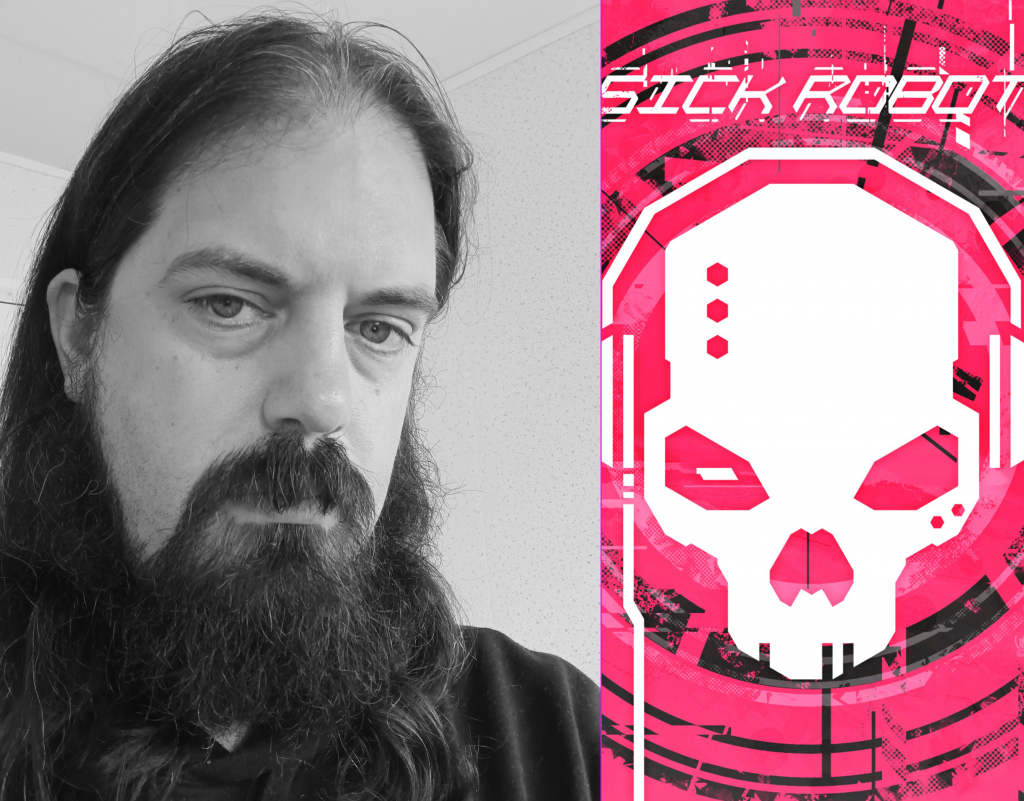By Keith Walsh
In York, England, a city with ancient Roman and Medieval structures around, Liam White creates his peculiar electronic music. York is of course now a modern technological city, and under the brand Sick Robot, White’s synth pop offers sometimes ironic, sometimes chilling melodic commentary on what the future here and elsewhere may sound like. I queried him at length about Sick Robot’s excellent new release, ‘Technical Ability.’ (My review of the album is at synthbeat.com )
PopularCultureBeat: There’s a pervasive cyberpunk thing here (ANALOG, Humanoid), with throbbing bass, distortion, vocals mixed down, repetition, gritty beats. How does the cyberpunk ethos influence you — how about your being informed by movies, animation, comics, other music?
Liam White: The cyberpunk ethos influenced me a lot while writing Technical Ability. I wanted it to sound more alive than ever by adding vocals and relying less on samples this time. Influences included the Commodore Amiga 500, Akira, Ghost in The Shell, and Lensman.
PopularCultureBeat: “Less Is More,” is bouncy, almost like “Take On Me” by Aha. What inspired this fun tune? PRISM has some Kraftwerk elements.
Liam White:. I’ve always fancied composing a computer game-themed piece. I mean, how hard can it be? Being a musician is always about pushing oneself further than before but without sounding like the rest. “Less is More” was written using Reason and my trusty Korg Monologue. Each track is layered and a lot of experimenting was done to get that punchy kick drum. “ANALOG” came about after being inspired by Depeche Mode and early 80s Electronica.
PopularCultureBeat: On “Fading,” how did you achieve that melodic guitar intro? Sounds reminiscent of a Sting song at first, but then it’s an electro ballad, somewhat like Radiohead.
Liam White: “Fading” began life as a demo that I’d written ages ago but never got around to completing it. I was listening to “Tubular Bells” by Mike Oldfield and the overdubbing techniques used during the production of that album. So I sat down and tried my own way of getting that distinctive sound. It switches to an electro ballad as I like to mix things up and if it works, it works!!! David Bowie did similar things so in a way, it’s my way of saying thank you.
PopularCultureBeat: As on your previous album ‘Modular Science‘, there’s a sense of this being a kind of electronic background music, kind of techno ambient. What’s your reaction to that interpretation?
Liam White: Ever since starting up as “Sick Robot”, I’ve always envisioned my music as being techno ambient. I like the creative freedom it brings and have recently played live, which was a task and a half in itself! For an artist like myself, interpreting this kind of music live can be quite different from what people would normally expect. In the end, I’d put together an audio/visual experience, which involved using old sci-fi movies from the 1940s set against a unique one-off piece that people could enjoy.
PopularCultureBeat: You say you create your own beats, using samples. Please tell about the steps involved, using Ableton.
Liam White:. I’m still creating my own beats using Ableton 11 and it can be a lengthy process as I like to stand out from the crowd. You want something that can still be recognized but also have your own stamp on things. For each track on Technical Ability I’d already begun to have an idea of how they should sound. The beats were meticulously layered from a vast array of drum samples and then treated to get that Sick Robot sound.
PopularCultureBeat: What are some new favorite synths, effects, VSTs, if any?
Liam White: I’m still using Ableton, but for this production, I was crossing between Ableton and Reason. I now have in my possession a Korg Monologue which is very responsive. My setup has improved since Modular Science as I purchased a Behringer U-Phoria UMC22 mixer. This has opened up so many possibilities as I’m able to record live instruments through this box of tricks straight into a DAW of choice. EQs such as pitch, modulation, time stretch, echo, and vintage delays were used as well.
PopularCultureBeat: How did you amass your massive samples library? How about the TD-3, are you still finding that useful? Were you frustrated, as I was when Behringer came out with a modded out version with even more features? How about the Behringer Crave, are you craving that ? 😊
Liam White: The TD-3 took a back seat during this production as I felt that it wasn’t needed and couldn’t find any use for it. I spent years looking for the perfect sample and found they were getting expensive, hence why the UMC22 mixer came into being. I do own a vast library of samples though, some were used to help lay the foundations for Technical Ability, but I wanted more control if that makes sense. As for a Behringer crave, I’ve got the TD-3 and a Behringer Model D Oscillator analog synth.
PopularCultureBeat: When interfacing with Ableton, please explain how you mix virtual synths with external hardware. What interface is required to sync them up?
Liam White: The UMC22 plugs into my PC via USB and acts as an external soundcard and a capture device. By plugging my synth straight into MIC/Line 1 and making sure that Ableton/Reason has picked it up, I can record directly.
PopularCultureBeat: Are you using any of the virtual synths with the Akai MPK Mini II? If so, how do you alter them?
Liam White:. I can control each individual virtual synth with the control knobs on the Korg but this can be time-consuming as with all technology, it doesn’t always go to plan.
PopularCultureBeat: What’s your musical training, or how did you first get acquainted with electronic music? What are your technical abilities? For example, the flute sound on on “After Burn” and the synth solo sounds like the product of skilled hands?
Liam White: All my musical training is self-taught. I have a very good ear for music and a lot of experimentation was involved to get where I am today.
PopularCultureBeat: If Robots can get sick, what hope is there for the rest of us, and for the future? Is this a metaphor for the sound of broken machines, something that kind of resonates in dystopian themes? How does a robot get sick?
Liam White: I guess even robots could get sick at some point? Perhaps AI could become so self-aware it won’t need the use of automatons.
PopularCultureBeat: Is “Future Shock” informed by Alvin Toffler’s books? Even though it starts off sounding like New Order, it has a darker sense and lack of melody and harmony.
Liam White: To be honest, I wasn’t even aware of Alvin Toffler’s books! The titles for all my material are picked at random so any coincidence is purely accidental!
PopularCultureBeat: Your voice works well here. Is that you on “Dimensions,” “Fading,” and “Technical Ability?”
Liam White: From the offset, I wanted “Technical Ability” to be more vocal than any previous release and so I decided to put some on, “Dimensions”, “Fading”, “Anomaly”, and “Technical Ability”
Thanks, Liam!
Sick Robot On Bandcamp
Sick Robot On Twitter
‘Technical Ability’ Review At Synthbeat.com
‘Modular Science’ Review At Synthbeat.com
finis

